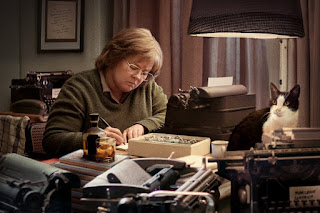I had been looking forward to seeing
this ever since I saw the trailer. The concept seemed delicious: A
struggling writer discovers she can make money by forging colorful
celebrity letters. And it's based on a true story! Turns out the
movie is decent entertainment that doesn't quite live up to its
concept.
Melissa McCarthy plays Lee Israel, a
writer with some successful biographies under her belt.
Unfortunately, when writing biographies, a successful book doesn't
make you rich. Lee ekes out a living in a low-paying proof-reading
job, which she loses for the same reason she has failed to break
through in the publishing world: she is a misanthropic asshole. Her
caustic wit is more caustic than witty, and people aren't willing to
put up with that behavior from anyone who isn't rich and powerful.
Desperate for cash, Lee stumbles upon a letter written by Fanny
Bryce. She figures it's worth big bucks, but the bookseller she
takes it to says it simply isn't interesting enough to sell for much.
Lee decides she can improve on it, so she forges a pithy P.S. and
the letter sells for enough to pay her rent. Lee's entrepreneurial
spirit kicks in, and soon she has a collection of old typewriters,
with which she forges colorful letters from a variety of dead celebs.
The money flows in, but Lee gets addicted as much to the creativity
as to the cash.
“Can You Ever Forgive Me” is based
on Lee Israel's memoir of the same name, and to her credit, she
whitewashes neither her toxic personality nor her crimes . She
ultimately forged and sold over 400 letters, at least one of which
found its way into a biography of the supposed author. She committed
what is probably the literary crime of the century.
This is a case where a little artistic
license might have been welcome. The film is funny at times and
certainly fascinating, but it might have been a bit more fun to watch
if they hadn't made Lee and her life so depressing. I think Melissa
McCarthy does the best she can with the role, but Lee comes across as
a drab person in drab clothes living in a drab apartment in,
honestly, a drab version of New York City. Considering the
outrageousness of the fraud Lee perpetrated, I feel like the
filmmakers could have done better. Maybe they could have shared more
of the apparently hilarious letters with us and focused less on Lee's
cat. Still it's an interesting story and well-acted, including a
terrific turn by Richard E. Grant as Lee's alcoholic, incorrigible
confidant. As for the film's failings, I suppose we can forgive
them.
3 stars out of 5














